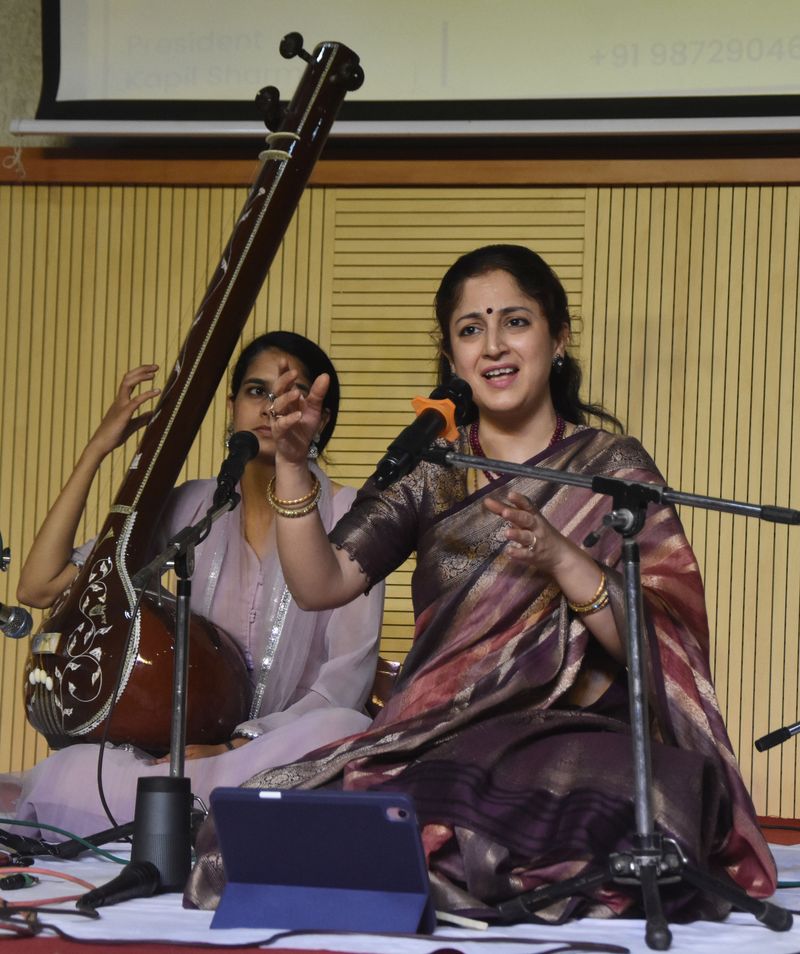The Tribune Interview: Vocalist Aastha Goswami
Hailing from the abode of Lord Krishna, vocalist Aastha Goswami’s singing has the reflection of Vrindavan, which is also her native place. Trained under the tutelage of Pandit Arun Bhaduri and Padma Vibhushan Girija Devi, Aastha has been performing for more than 20 years all over India, with numerous awards and honours to her credit.
An empanelled artiste of the Indian Council for Cultural Relations, Aastha has been performing since 1995 and has numerous performances to her credit.
Astha Goswami was recently in Ludhiana to perform at a musical show. She talked to Manav Mander on the sidelines of the event. Excerpts from the interview:
Tell us something about your singing and how being from Vrindavan has impacted it?
Being based in Vrindavan — the cultural-spiritual centre of Vaishnavism/Krishna worship — gives an edge to my singing. Deeply rooted in the famous Kirana (Gharana) classical tradition of Hindustani music, I also immerse myself in the stream of devotional music. I have my unique style of Padavali Gaayan, which imbibes the intricacies of Khayal Gayaki filled with deep emotions. My repertoire is replete with classical compositions and Thumris and have rich and rare collection of compositions of the Braj region like Krishna-Radha Janamotsava Badhai Gaan, Jhoola, Ashtyaam Raag Seva, songs of different seasons and festivals like Hori, Basant, Savan, etc. Every festival and season is celebrated in Vrindavan and that is reflected in my singing.
How did you develop love for music?
The environment at my home was such that I was surrounded by music and art since my birth. My mother use to love classical music and we have heard only classical music at our home. My father was into services and wherever we went, new place taught me so many things in terms of music. My father used to love to paint. So, at home I was always surrounded by art and music and this is how I developed my love for music.
At what age you started singing?
I was four and a half years old when my Maasi (maternal aunt) first spotted me singing ‘Sa Re Ga Ma’. We can say it was the beginning of my singing journey. All my maternal aunts and my mother had learnt singing and they started teaching me after seeing my interest. They used to give me small lessons according to my age.
Who was your first guru and at what age you gave your first performance?
I received my first formal training form Pandit Sita Saran Singh Chauhan and the foundation of my singing was laid by him. At school, I used to perform regularly in functions. I was a student of Convent School and was a part of school choir. But my first formal performance was at the age of 15.
What you have to say about young generation’s interest in classical music?
Present generation believes in instant coffee and instant noodles. They also want instant success, which is not possible especially when it comes to classical music. Uploading the video on social media and getting likes is not success, one needs long years of riyaaz in classical music. Kids today want to become overnight stars and don’t have patience. ‘Sur’ is very important in classical music and practice is the key to master it. Find the right guru and follow his path.
How do you see reality shows in context of classical singing?
Reality shows have both pros and cons and today I want to talk only about the positive aspects. These shows have definitely created lot of exposure about classical music and taught the young generation how classical music is the base and one has to learn it to master the art of singing. Reality shows focussing on classical music help enhance its appreciation and education by showcasing talents, offering accessible platforms, and engaging new audiences. This approach can also lead to more formal education and integration of classical music while learning music and fostering a broader understanding of the art form.
Do you ever think about playback singing?
I was busy getting ‘taaleem’ (education) for classical music and first wanted to create a niche in classical music because playback singing consumes a lot of time. We have classical singers like Ghulam Ali and Parween Sultana, who have sang in the films and given master pieces even by maintaining their classical streak. If any such proposal comes my way where my classical singing will remain intact. I won’t mind doing it as it is the medium to reach wider audience.
The Tribune, now published from Chandigarh, started publication on February 2, 1881, in Lahore (now in Pakistan). It was started by Sardar Dyal Singh Majithia, a public-spirited philanthropist, and is run by a trust comprising five eminent persons as trustees.
The Tribune, the largest selling English daily in North India, publishes news and views without any bias or prejudice of any kind. Restraint and moderation, rather than agitational language and partisanship, are the hallmarks of the newspaper. It is an independent newspaper in the real sense of the term.
The Tribune has two sister publications, Punjabi Tribune (in Punjabi) and Dainik Tribune (in Hindi).
Remembering Sardar Dyal Singh Majithia
